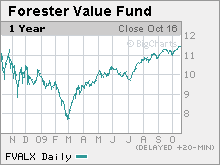Why you should buy health care stocks now
Health care reform may have their future on hold, but star fund manager Tom Forester says the worst is already built in.
 |
| Forester: ""While we've been conservative the whole time, now we're starting to embrace our conservatism." |

NEW YORK (Fortune) -- With health care stocks cheap compared to the rest of the market, Tom Forester thinks that a bad-case scenario health care bill is already priced into the sector.
"These are emotionally difficult stocks to hold right now because they are in the crosshairs," says the manager of the Forester Value Fund (FVALX). But it's his job to hold onto them. "Value guys are paid to buy stocks that are cheap and have some emotional component in it."
Health care stocks are hurting the fund a bit this year, he says, but last year they helped it become the only diversified stock fund in the U.S. that didn't lose money. Forester also beat the S&P 500 (SPX) by about 40 percentage points, according to Morningstar.
So far 2009 hasn't been a bad year either. The fund's total return is up 15% since January, but it trails Morningstar's large-cap value fund category by about 7 percentage points.
As a value investor, price-to-earnings ratios are Forester's No. 1 priority when he's looking to invest. A low P/E tells him people don't like the stock, and then he tries to figure out why. Right now health care stocks are trading at seven times earnings with the rest of the market at three times that level.
"Companies sometimes get knocked because they're uncomfortable," he says. He points to insurance brokers as an example, which went down 40% in a week after former New York Attorney General Eliot Spitzer went after them in 2004.
"Nobody wanted to be known for holding those stocks," he says. "But if you're just looking at the cold, hard, financial reality, the odds of them really being criminal are slim and at some point there still is a model there that makes quite a bit of money."
Right now, for Forester, health care is in a similar situation. At first he didn't think the government was going to take on the issue because of the expense. But now these companies have gotten negative press for about eight months.
"In order for the politicians to pass something as 'reform' they have to have a bogeyman to go after and demonize them," Forester says. "It's politics 101. In this case it's health-care providers."
The bad press has kept health care stocks from participating in the rally, but Forester says that will only last as long as the uncertainty. "We think once the noise simmers down and the dust settles on this, these things will do quite well."
At this point investors just don't know the impact it will have on major issues. But Forester thinks many are likely to get resolved by the first quarter of 2010 because politicians want to keep controversy as far away from election season as possible.
"You're going to have a lot of noise, a lot of arm-waving and at the end of the day they're going to pass a bill that's going to be a little negative to fairly neutral," he says.
Forester points to the Clinton health bill of about 15 years ago as a model for the way shares will perform. Health care stocks overall fell 40% on the same fears, he said, but then they jumped fivefold over the next 10 years because the plan failed. This time around he doesn't expect the same kind of return, but he thinks investors could see a 30%-60% move.
In the sector, Forester owns companies like Schering Plough and Wyeth, which have since respectively been bought by Merck (MRK, Fortune 500) and Pfizer (PFE, Fortune 500). They both did well for him this year with great takeover premiums.
Forester added Bristol-Meyers (BMY, Fortune 500) to his portfolio in March of 2008, and while it hasn't taken off with the rest of the market, it has still outperformed the S&P 500 significantly from when he bought the stock. Its 5.5% dividend yield also helps.
Right now he's particularly focused on stable companies. Over the last six months, Forester says investors have wanted the unstable stocks because they tanked and then ran. Forester says that he bought a little bit of the junk too, but now the pendulum is shifting back to quality.
"While we've been conservative the whole time," he says, "now we're starting to embrace our conservatism." ![]()
-
 The retail giant tops the Fortune 500 for the second year in a row. Who else made the list? More
The retail giant tops the Fortune 500 for the second year in a row. Who else made the list? More -
 This group of companies is all about social networking to connect with their customers. More
This group of companies is all about social networking to connect with their customers. More -
 The fight over the cholesterol medication is keeping a generic version from hitting the market. More
The fight over the cholesterol medication is keeping a generic version from hitting the market. More -
 Bin Laden may be dead, but the terrorist group he led doesn't need his money. More
Bin Laden may be dead, but the terrorist group he led doesn't need his money. More -
 U.S. real estate might be a mess, but in other parts of the world, home prices are jumping. More
U.S. real estate might be a mess, but in other parts of the world, home prices are jumping. More -
 Libya's output is a fraction of global production, but it's crucial to the nation's economy. More
Libya's output is a fraction of global production, but it's crucial to the nation's economy. More -
 Once rates start to rise, things could get ugly fast for our neighbors to the north. More
Once rates start to rise, things could get ugly fast for our neighbors to the north. More








